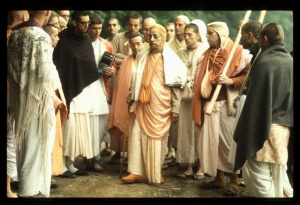SB 10.54.45: Difference between revisions
(Vanibot #0018 edit: make synonym terms in Sanskrit italic in SB - Vanisource) |
(Vanibot #0054 edit - transform synonyms into clickable links, which search similar occurrences) |
||
| Line 23: | Line 23: | ||
<div class="synonyms"> | <div class="synonyms"> | ||
''dehaḥ'' | ''[//vanipedia.org/wiki/Special:VaniSearch?s=dehaḥ&tab=syno_o&ds=1 dehaḥ]'' — the material body; ''[//vanipedia.org/wiki/Special:VaniSearch?s=ādi&tab=syno_o&ds=1 ādi]'' — beginning; ''[//vanipedia.org/wiki/Special:VaniSearch?s=anta&tab=syno_o&ds=1 anta]'' — and end; ''[//vanipedia.org/wiki/Special:VaniSearch?s=vān&tab=syno_o&ds=1 vān]'' — having; ''[//vanipedia.org/wiki/Special:VaniSearch?s=eṣaḥ&tab=syno_o&ds=1 eṣaḥ]'' — this; ''[//vanipedia.org/wiki/Special:VaniSearch?s=dravya&tab=syno_o&ds=1 dravya]'' — of the physical elements; ''[//vanipedia.org/wiki/Special:VaniSearch?s=prāṇa&tab=syno_o&ds=1 prāṇa]'' — the senses; ''[//vanipedia.org/wiki/Special:VaniSearch?s=guṇa&tab=syno_o&ds=1 guṇa]'' — and the primary modes of material nature (goodness, passion and ignorance); ''[//vanipedia.org/wiki/Special:VaniSearch?s=ātmakaḥ&tab=syno_o&ds=1 ātmakaḥ]'' — composed; ''[//vanipedia.org/wiki/Special:VaniSearch?s=ātmani&tab=syno_o&ds=1 ātmani]'' — on the self; ''[//vanipedia.org/wiki/Special:VaniSearch?s=avidyayā&tab=syno_o&ds=1 avidyayā]'' — by material ignorance; ''[//vanipedia.org/wiki/Special:VaniSearch?s=kḷptaḥ&tab=syno_o&ds=1 kḷptaḥ]'' — imposed; ''[//vanipedia.org/wiki/Special:VaniSearch?s=saṁsārayati&tab=syno_o&ds=1 saṁsārayati]'' — causes to experience the cycle of birth and death; ''[//vanipedia.org/wiki/Special:VaniSearch?s=dehinam&tab=syno_o&ds=1 dehinam]'' — an embodied being. | ||
</div> | </div> | ||
Latest revision as of 19:26, 17 February 2024

A.C. Bhaktivedanta Swami Prabhupada
Please note: The synonyms, translation and purport of this verse were composed by disciples of Śrīla Prabhupāda
TEXT 45
- deha ādy-antavān eṣa
- dravya-prāṇa-guṇātmakaḥ
- ātmany avidyayā kḷptaḥ
- saṁsārayati dehinam
SYNONYMS
dehaḥ — the material body; ādi — beginning; anta — and end; vān — having; eṣaḥ — this; dravya — of the physical elements; prāṇa — the senses; guṇa — and the primary modes of material nature (goodness, passion and ignorance); ātmakaḥ — composed; ātmani — on the self; avidyayā — by material ignorance; kḷptaḥ — imposed; saṁsārayati — causes to experience the cycle of birth and death; dehinam — an embodied being.
Translation and purport composed by disciples of Śrīla Prabhupāda
TRANSLATION
This material body, which has a beginning and an end, is composed of the physical elements, the senses and the modes of nature. The body, imposed on the self by material ignorance, causes one to experience the cycle of birth and death.
PURPORT
The material body, composed of various material qualities, elements and so on, attracts and repels the conditioned soul and thus entangles him in material existence. Because of our attraction and repulsion for our own body and other bodies, we establish temporary relationships, dedicate ourselves to great endeavors and sacrifices, concoct imaginary religions, make noble speeches and thoroughly involve ourselves in material illusion. As Shakespeare said, "All the world's a stage." Beyond the somewhat absurd theater of material existence is the real and meaningful world of Kṛṣṇa consciousness, the liberated life of pure souls devoted in loving service to the Supreme Lord.